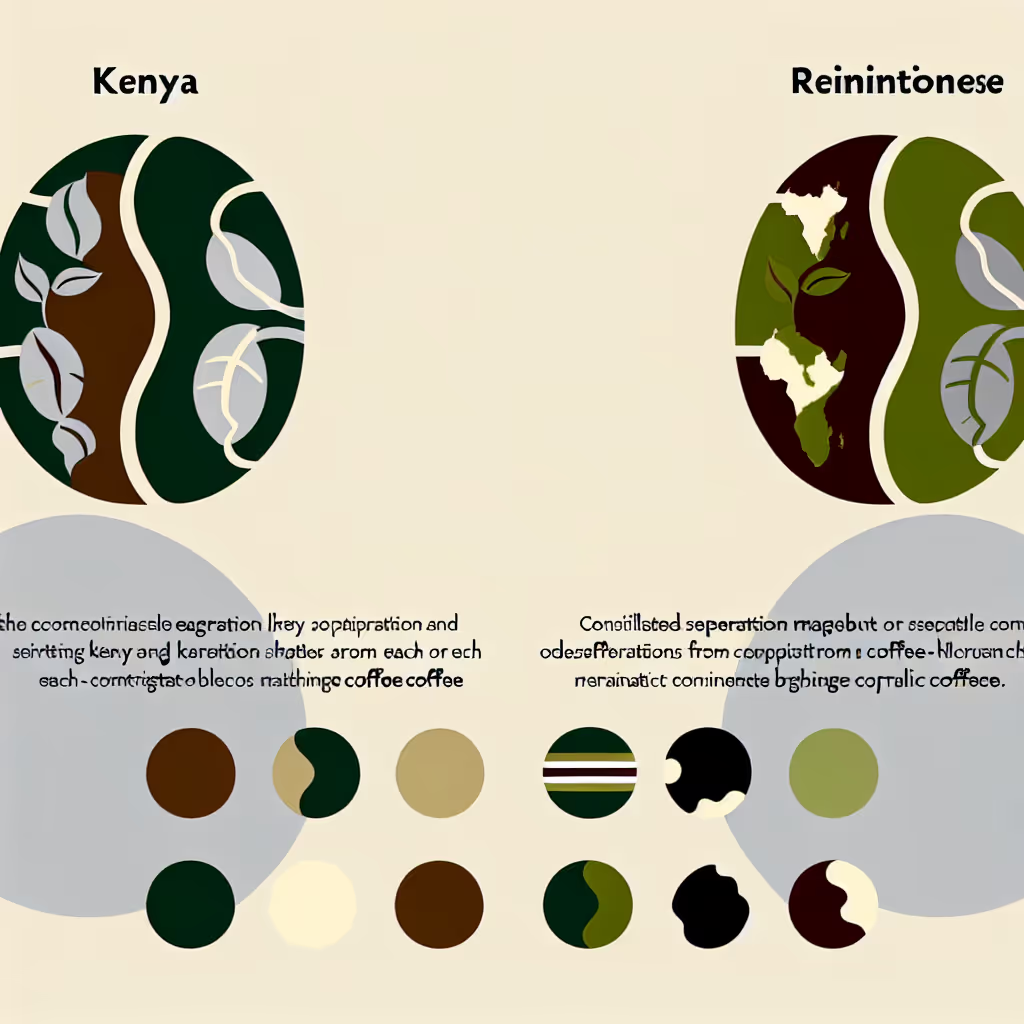Kenyan Vs. Panamanian Coffee
This comparison explores the distinct qualities of Kenyan and Panamanian coffee, highlighting their unique flavor profiles, growing conditions, and brewing methods to help coffee enthusiasts make informed choices.

Brief Description
Kenyan coffee is renowned for its bright acidity, full body, and complex flavor profile. Grown in the rich volcanic soils of the Central Highlands, these beans benefit from ideal climate conditions and meticulous processing. The result is a cup that's bold, wine-like, and often described as the 'connoisseur's choice'. With notes ranging from blackcurrant to citrus, Kenyan coffee offers a truly unique and memorable tasting experience.
Panamanian coffee, particularly from the Boquete region, is renowned for its exceptional quality and unique flavor profiles. The country's most famous variety, Geisha, has revolutionized the specialty coffee world with its delicate floral and tea-like characteristics. Panama's diverse microclimates and careful cultivation practices contribute to producing some of the world's most sought-after and expensive coffees, known for their complexity, clarity, and distinctive taste.
Importance of Comparison
Comparing Kenyan and Panamanian coffee is crucial for coffee lovers seeking to explore the diverse world of single-origin beans. These two origins represent some of the finest and most distinctive coffees available, each offering unique flavor profiles and characteristics. Understanding their differences can help consumers expand their palate, make informed purchasing decisions, and appreciate the nuances of specialty coffee.
Key Attributes
Origin
Kenyan
Panamanian


Consumer Guide
When choosing between Kenyan and Panamanian coffee, consider your flavor preferences. Kenyan coffee is known for its bright acidity and full body, with notes of blackcurrant and citrus. It's ideal for those who enjoy a bold, complex cup. Panamanian coffee, especially the Geisha variety, offers a more delicate, floral profile with tea-like characteristics. For brewing, Kenyan coffee excels in methods that highlight its acidity, such as pour-over and French press. Panamanian coffee shines in pour-over and Chemex preparations, which emphasize its clarity and complexity. Consider the altitude and processing methods: Kenyan beans are typically grown at higher altitudes and undergo double fermentation, while Panamanian beans benefit from diverse microclimates and various processing techniques.
Expert Opinions
Coffee expert James Hoffmann notes, 'Kenyan coffee often represents the pinnacle of brightness and complexity in the cup, while top Panamanian coffees like Geisha offer an unparalleled delicacy and florality.' Barista champion Lem Butler adds, 'The contrast between these origins is striking. Kenyan coffees punch you with their intensity, while Panamanian coffees, especially Geisha, seduce you with their subtlety and elegance. Both are essential experiences for any serious coffee enthusiast.'
FAQs
Kenyan coffee is known for its bright acidity, full body, and complex flavors including blackcurrant, citrus, and floral notes. Panamanian coffee, particularly Geisha, is celebrated for its delicate floral and tea-like characteristics, often with notes of citrus and tropical fruit.
Kenyan coffee is typically grown at higher altitudes (1400-2100m) in volcanic soils, while Panamanian coffee benefits from diverse microclimates at slightly lower altitudes (1000-1800m). These differences contribute to the unique flavor profiles of each origin.
For Kenyan coffee, pour-over, French press, and cold brew methods work well to highlight its acidity and complexity. Panamanian coffee, especially delicate varieties like Geisha, excels with pour-over, Chemex, and Aeropress methods that emphasize its clarity and nuanced flavors.
Kenyan coffees often undergo washed processing with a unique double fermentation method, followed by sun-drying. Panamanian coffees employ a variety of processing methods including washed, natural, and honey processing, allowing for a wider range of flavor profiles.
Panama produces more coffee annually, with approximately 100,000 metric tons compared to Kenya's 50,000 metric tons. However, it's important to note that production volume doesn't necessarily correlate with quality, as both origins are known for their premium beans.
While both origins produce premium coffees, Panamanian Geisha varieties are often among the most expensive coffees in the world. However, high-quality Kenyan coffees can also command premium prices. The cost varies depending on the specific farm, harvest, and quality of the beans.
Conclusion
Both Kenyan and Panamanian coffees offer exceptional quality and unique tasting experiences. Kenyan coffee stands out for its bright acidity, full body, and complex flavor profile, making it ideal for those who enjoy a bold, intense cup. Panamanian coffee, particularly Geisha, offers a more delicate, floral experience that's prized by specialty coffee enthusiasts. When choosing between the two, consider your flavor preferences, brewing methods, and willingness to experiment. Both origins represent the pinnacle of single-origin coffees and are worth exploring for any serious coffee lover looking to expand their palate and appreciation for the diverse world of specialty coffee.






